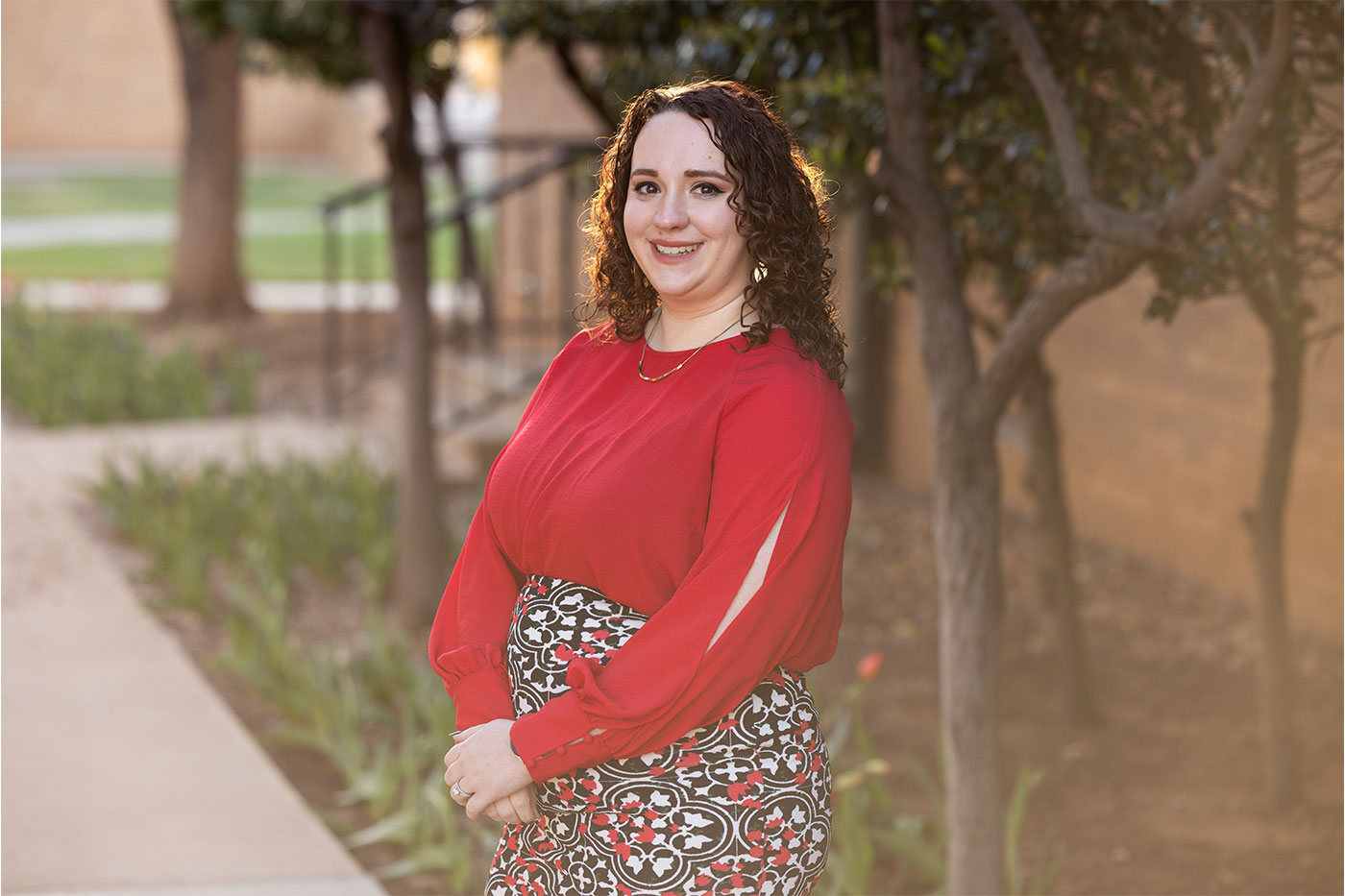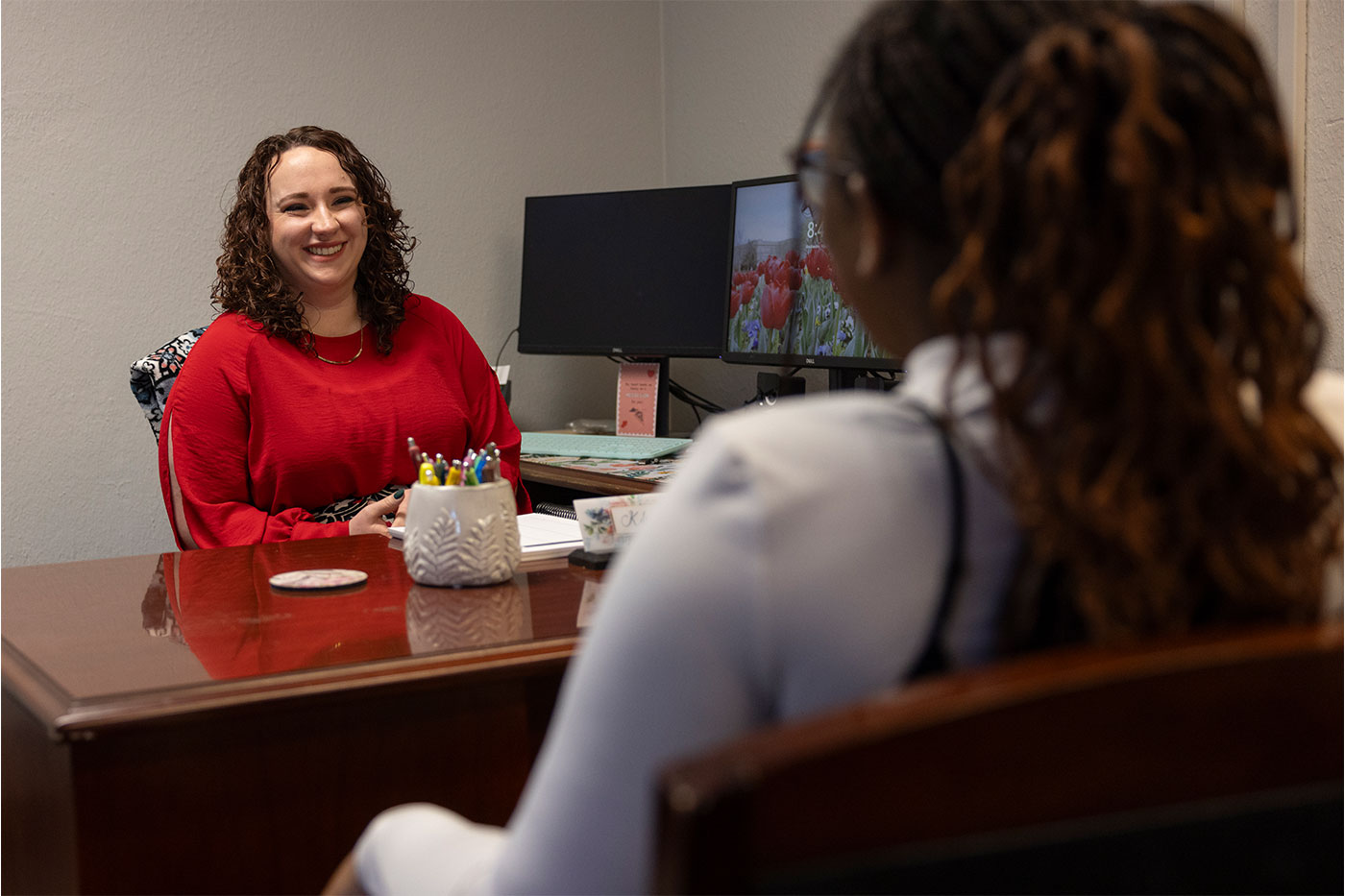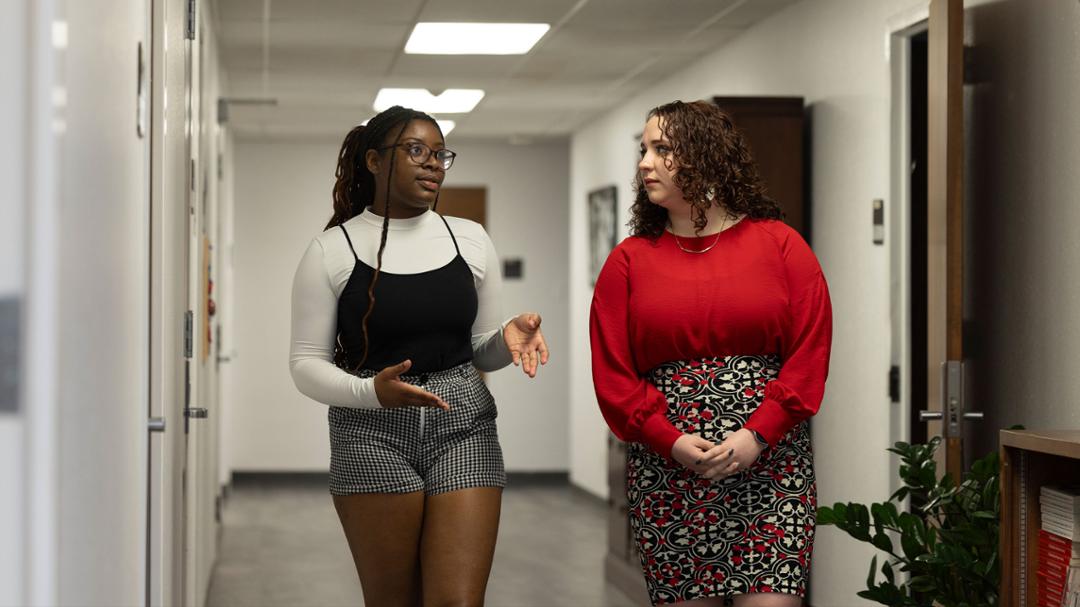Kelsey Kimzey and Jill Hernandez have implemented a Resilience & Retention program tailored to honors students who often slip through the cracks.
There is a misconception that high-performing students don’t need much support.
Recent research in Texas Tech University’s Honors College has proven even the best and the brightest need a helping hand.
Honors College Dean Jill Hernandez and Senior Academic Adviser Kelsey Kimzey have launched a Resilience & Retention program that is showing promise after only a few semesters. With retention rates steadily rising and Hernandez and Kimzey publishing their research for other universities, it’s another way Texas Tech is leading the way in academic innovation.
Interceding & Intervening
Kimzey has a tremendous deal of empathy for the honors students she advises because she sees herself in them. A Lubbock native, she was raised by educators and was active in academics. She still faced obstacles, though.
“I was diagnosed with dyslexia in the second grade,” Kimzey said. “I had just enough dyslexia for it to interfere with school but not enough for the state to require support.”

Luckily, Kimzey’s parents recognized the need for early intervention, solidifying their daughter’s long-term success. Because Kimzey was diagnosed at such a young age, her learning disability doesn’t carry much shame. It’s just part of who she is, she says.
But for many people, a learning disability does carry shame. This is especially true in high-achieving students who mask their inner struggles.
According to the American Psychological Association, these students are known as “multiexceptional” youth, and their talents and disabilities often mask each other.
Unfortunately, many of these disabilities are not identified or treated until college, and sometimes, well after. Kimzey was surprised by how many intake forms she was getting with learning disabilities checked, or more common, students checking boxes indicating they were concerned they had an undiagnosed learning disability.
“That’s another misconception,” Kimzey said. “We have students on campus who are incredibly intelligent and have a learning disability. It’s not accurate to assume people with learning disabilities are somehow less intelligent.”
Managing the Clock
The Resilience & Retention program targets multiple pain points for honors students, of which learning disabilities are only a small part of the puzzle. Time management and study skills also are stumbling blocks.
In high school, a student’s day is quite structured. The average high school student spends approximately 30 hours a week at school. In turn, the average college student spends 12-16 hours a week in class. This sudden shift can give the illusion of added free time when most work is expected to be completed outside of class.
For students who come to college unprepared, the transition is jarring. For honors students, the expectations are even higher, and their schedules are busier.
Honors students often enroll in more courses per semester than other students. They must maintain a 3.5 GPA or higher, fulfill a set amount of volunteer hours, complete 24 hours of specialized honors coursework, two of which are seminars, all before graduating. There also are added social expectations and events that honors students are encouraged to attend.
“One of the biggest concerns I hear from students is time management,” Kimzey said.
These are students who were straight-A achievers in high school, often not having to put in much effort, Kimzey says. When they get to college the adjustment hits them like a brick.
“It also doesn’t help that these students often hear statements like ‘Oh, you’re an honors student, you’ll be fine.’” Kimzey said. “When in reality, they’re stressing and regularly pulling all-night study sessions.”
According to Kimzey, students express they think all-nighters are not only normal, but expected in college. Rather than the exception to the rule, students think they should be studying all hours of the night and that it’s normal to be sleep-deprived and have poor mental health.
Kimzey suspects this largely comes from media portrayals of college.
“Incoming students see a lot of television and movies that portray unrealistic and unmaintainable study habits,” she said.
With these challenges stacked against honors students, and some people dismissing high achievers’ needs, Hernandez and Kimzey decided to do something about it.
Resilience & Retention
The road to graduating with honors is no easy feat. That’s why only 5.4% of Texas Tech’s student population does it. When students decide to travel this road, leadership does everything in its power to help them succeed.
That’s how the Resilience & Retention (R&R) program started.
R&R first began at the University of Texas San Antonio (UTSA) as an institutional effort to bring relational advising to students who were academically at-risk.
“At the beginning of my time at Texas Tech, the honors advising team worked with me to identify where the college could improve in advising our own high-achieving students,” Hernandez said. “I saw instant parallels to UTSA’s efforts with a different population of students.”
Hernandez joined Texas Tech in 2022, and at that time, the Honors College’s retention numbers were suffering.
“We were losing students, but we weren’t sure why,” Kimzey said.
Texas Tech wasn’t losing these students, but the Honors College was. Students were graduating, just not with honors. So, when Hernandez introduced an honors-tailored R&R program, Kimzey enthusiastically agreed to spearhead it.
The process began by identifying 61 students to participate in a pilot program. The mission was to create a high-touch mentorship experience, not only helping those at risk of being suspended from the college for academic probation, but also successfully forecasting those who might be at future risk.
The pilot group in 2023 showed a positive correlation in participation and retention. While those statistics are exciting, the outcome that stood out most was qualitative.
“More than the numbers, I saw an increase in confidence,” Kimzey said. “Students felt more secure going into their next semester and expressed confidence in their study skills and interpersonal abilities.”
When a student participates in the R&R program, they work with Kimzey and other advisers to put a success plan in place. This looks different for every student. Sometimes this includes an agreement to make use of a professor’s office hours to better understand material. For other students, they work on time-blocking their schedules. The pilot program ran for one semester with a pre-self-assessment, mid-semester check-in and a final check-in.
The college saw a dramatic rise in retention. The average retention rate was around 50%, but students who participated in the pilot were retained at an 80% rate. Participants even saw an increase in GPA at almost double the rate as those in the control group.
The program also intervened beyond academics.
Kimzey and her team are there for students during life’s tougher moments. Sudden losses can threaten a student’s academic progress. Whether that’s a death of a family member or friend, or even a breakup, the team is there to listen and to refer students to the many mental health and wellbeing resources on campus.
Kimzey’s listening skills and compassion are part of the reason she went into this work.

In her own undergraduate days at a private university, Kimzey was unofficially a part of retaining a student who experienced a traumatic hazing incident and was planning to drop out of school.
“I didn’t know until after the fact, but he said I was part of him staying,” Kimzey said.
But that’s just who Kimzey is. She fosters a sense of belonging and purpose in everyone she knows.
For Tijana Lekić, the R&R program along with Kimzey’s support has made all the difference.
“The R&R program is one of the reasons, if not the reason, I am still in the Honors College,” said Lekić, a third-year industrial engineering major. “Coming into university, I thought I understood how to study and manage life, but I did not.”
Lekić struggled finding a balance among making new friends, work, school and having a personal life, all while away from home. She quickly realized she needed support.
“Ms. Kimzey did a wonderful job creating my success plan,” Lekić said. “Together we assessed my struggles, and she then researched and found awesome methods to help me overcome. Although it takes the grit of the student to want to overcome their struggles, the R&R program provides the support you need and gives you courage as a student.”
Lekić plans to attend law school after graduation.
A New Standard
The R&R program is in its third semester and continues to have a positive impact on students.
Hernandez and Kimzey presented their findings recently at the National Collegiate Honors Council Conference in Chicago, and they have plans to present at numerous other conferences around the nation.
“We are excited that Texas Tech’s Honors R&R program is becoming a national model for meeting the unique needs of honors students,” Hernandez said. “Kelsey’s work, which has been featured at several conferences and now has been published, demonstrated the transformative impact R&R has on assessing and addressing challenges to student success.”
Honors students are learning about the program and Kimzey has seen them advocating for themselves, wanting more information. In fact, students interested in the program have even started coming to her.
This is the mark of honors students – always wanting to get better.
“Most students have a semester that knocks them off-course,” Kimzey said. “The idea behind R&R is making sure that one semester does not define them.”

